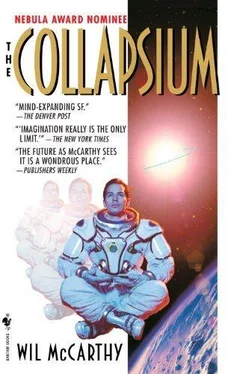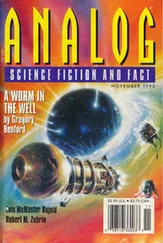Wil McCarthy - The Collapsium
Здесь есть возможность читать онлайн «Wil McCarthy - The Collapsium» весь текст электронной книги совершенно бесплатно (целиком полную версию без сокращений). В некоторых случаях можно слушать аудио, скачать через торрент в формате fb2 и присутствует краткое содержание. Город: New York, Год выпуска: 2000, ISBN: 2000, Издательство: Del Rey/Ballantine, Жанр: Фантастика и фэнтези, на английском языке. Описание произведения, (предисловие) а так же отзывы посетителей доступны на портале библиотеки ЛибКат.
- Название:The Collapsium
- Автор:
- Издательство:Del Rey/Ballantine
- Жанр:
- Год:2000
- Город:New York
- ISBN:0-345-40856-X
- Рейтинг книги:3 / 5. Голосов: 1
-
Избранное:Добавить в избранное
- Отзывы:
-
Ваша оценка:
- 60
- 1
- 2
- 3
- 4
- 5
The Collapsium: краткое содержание, описание и аннотация
Предлагаем к чтению аннотацию, описание, краткое содержание или предисловие (зависит от того, что написал сам автор книги «The Collapsium»). Если вы не нашли необходимую информацию о книге — напишите в комментариях, мы постараемся отыскать её.
The Collapsium — читать онлайн бесплатно полную книгу (весь текст) целиком
Ниже представлен текст книги, разбитый по страницам. Система сохранения места последней прочитанной страницы, позволяет с удобством читать онлайн бесплатно книгу «The Collapsium», без необходимости каждый раз заново искать на чём Вы остановились. Поставьте закладку, и сможете в любой момент перейти на страницу, на которой закончили чтение.
Интервал:
Закладка:
He turned, and immediately regretted the wave of nausea this sudden movement brought. But he saw what she was pointing at: a little dome of blue at the bottom edge of the window, with three brightish pinpoints hovering above it. Uranus and its moons? The dome climbed and grew in the view; in half a minute, the whole planet would be visible.
He reached out to give Muddy’s leg a shake. “Wake up. Wake up! You’ll want to see this. At least, I think you will…”
Muddy, who was fully reclined in his couch, groggily opened his eyes. “What? What’s that? Oh. Mmm. You’re very kind to wake me, Lordship, but actually, I’ve seen planets before.” And with that he turned away and fell back into stuporous sleep.
Impressive views have a way of saturating the mind; the planet was visible for a good twenty minutes, but never so large or close as that first stunning glimpse. And really, the planet didn’t have any features to speak of, just a uniform, powder-green haze sinking down for thousands upon thousands of kilometers. The world was huge, able to contain a dozen Earths, but it shrank quickly, becoming a little ball and finally a bright green speck before disappearing down the other side of the window.
An hour and a half later, they crossed the orbit of Saturn, which of course was completely uneventful since the planet was nowhere nearby. An hour after that, they passed Jupiter’s similarly empty orbit. Against the starscape soon afterward, they spotted a few bright, fast-moving specks that proved, under the enhancement of wellstone telescopes, to be asteroids. That was good for a few minutes’ distraction, in the hour and a half it took them to reach the orbit of Mars.
Then the pace of things started to pick up. The ship was slowing down dramatically, now cruising at barely an eighth of its thirty-thousand-kilometer-per-second peak velocity, but the inner planets were a lot closer together than their outer cousins. Earth was barely twenty minutes beyond the Red Planet, and Sabadell-Andorra had started picking up random bits of radio noise. Nothing useful—just data bursts and occasional, panicky voices—but it made clear that they’d reentered civilization, and that civilization, though deprived of both its communication networks and the more primitive means of physical travel, nonetheless still had some fight in it.
They encountered their share of gravitational anomalies, too: Iscog fragments and free-floating neubles ejected from some industrial site somewhere. Their course jinked around in a way that worried Bruno. Finding the sun was not too difficult, but finding Tamra’s little di-clad neutronium work platform in the sun’s glare might very well be. Especially if their own course was misplotted. It wasn’t like they could ping the Iscog for their precise location. These thoughts made him impatient.
Still, the view above them was naught but stars, the sun invisible below their feet, the planets hidden by distance and geometry. Even civilization was large, consisting mostly of empty space. Even an inertialess grappleship needed some time to cross through. To reach the orbit of Venus took them another twelve minutes, by which time they’d shed 95% of their velocity and were rapidly shedding the rest. Mercury was deep in the sun’s gravitational sink, farther from Venus than Earth was. They’d need thirty-six minutes more to reach it. From there, though, it should only be a few more minutes to reach the platform where Tamra and her entourage supposedly awaited rescue. Assuming their course was proper…
Once again, Bruno shook Muddy awake.
Once again, Muddy responded groggily and tried to go back to sleep.
“Oh, no, no,” Bruno said this time. “I don’t know what you took, or how much, but I’ll wager it wasn’t what I’d picked for you. So okay, you’ve had a little break from yourself, but you get up and fly this ship now, Declarant-Philander; you’ve yet to teach me how to do it myself. Go on, take something to wake up if you like, but we need you at the controls.”
“Hmmpf,” Muddy replied, opening bloodshot eyes to peer at him. “Where are we?”
“Just sunward of Venus. We’ve just about half an hour to go, and you’ll need to start scanning for Tamra’s platform.”
“Hmmpf,” Muddy said again, though in a livelier, more interested way. “That far, are we? Yes, I’s-s-suppose I should be getting up, despite all the misery that entails. I can take a pill, you say?”
“Muddy, so long as you’re awake and alert you can take any damned thing you please. We’ll sort your problems out later, right?”
“All right, yes.”
He struggled out of his couch, fell squarely atop a mewling Hugo, and made his way to the fax machine, which insisted on giving him a chilled electrolyte solution before dispensing any medication. From the look on Muddy’s face, it tasted none too wonderful.
“All right?” Bruno asked, when Muddy finally settled back down into his couch.
“Please, if you would, wait for the drugs to take effect.” Muddy’s voice was thick and slow.
“I’ll do no such thing. Begin scanning, please.”
“Well, aye, Your Lordship.”
“You’ve learned sarcasm in your years away.”
“And you’ve learned to be a prick. Beginning scan, sir. The ship is perfectly capable of doing this by itself, you know. Navigation and helm control, too. The instrument panel is just for fun, as I’m sure you’ve probably guessed. Well, it does make a few things easier—whoa. Scan complete; I’ve found a platform. Would you like a telescopic image?”
“Please.”
A holographic window appeared in the brick wall beside Bruno’s head. On it, he could clearly see a thin disc of opaque but gloriously shiny white. Di-clad neutronium, yes, spinning slowly in the sunlight. And, pinned to the bottom of the disc as if glued there, the somewhat larger shape of a police cruiser, whose battered hull had apparently reverted to native iron, its wellstone sheathing dead or inactivated.
“Is the dome intact?” Bruno asked rhetorically. The clear dome that held in the platform’s air was pointed away from them at the moment, pointed straight down at the full fires of the sun.
“Looks like someone did get to them,” Deliah observed. “It must have been a hell of a trip.”
“And an unfortunate one,” Bruno said. “It doesn’t look as though that cruiser set down there peacefully. Look at that hull: the bending, the stress ripples. Do you see any lights on it?”
“I’m compensating for sunlight,” Muddy volunteered. “We’re looking almost straight down. There may be lights that are simply drowned out. But I’m doubtful—that iron looks partly melted to me.”
“Indeed,” Bruno said. “Any signs of air leakage?”
Muddy checked. “No, sir. No signs of air at all, not even traces in the immediate vicinity.”
“They might have spacesuits on,” Deliah said.
“There’d still be traces,” Muddy sniffed. “That hull’s been devoid of life for at least a day. Probably longer. The air blew out and crystallized, and the’s-s-solar wind has carried away the evidence.”
“Well, then,” Bruno said. “Rest in peace, brave men and women of the Royal Constabulary. Here’s yet another tragedy to lay at the feet of Marlon Sykes.”
Deliah pointed. “Here comes the dome. It looks intact!”
The platform’s slow rotation was turning the shipwreck back down to face the punishing sunlight, and turning the dome—the only place that might yet harbor survivors—toward the cold blackness of space. Bruno’s heart sank. Intact or no, the dome’s contents would undergo brutal thermal cycles, heating up probably to several hundred degrees at peak, and then bleeding it all away again, bottoming out probably well below freezing. Living tissue did, of course, have its compensating mechanisms, its exothermic metabolism and its evaporative cooling, its circulatory system to refresh chilled or overheated tissues with milder fluids from the body’s interior. Ironically, human beings stood up to such punishment better than many inanimate objects, better even than the clothing and shoes that should nominally be protecting them. Indeed, the Queen and her people had allegedly survived at least six revolutions of the platform before Deliah had lost contact with them. But two weeks“ ? It seemed impossible that even the hardiest of humans could survive that .
Читать дальшеИнтервал:
Закладка:
Похожие книги на «The Collapsium»
Представляем Вашему вниманию похожие книги на «The Collapsium» списком для выбора. Мы отобрали схожую по названию и смыслу литературу в надежде предоставить читателям больше вариантов отыскать новые, интересные, ещё непрочитанные произведения.
Обсуждение, отзывы о книге «The Collapsium» и просто собственные мнения читателей. Оставьте ваши комментарии, напишите, что Вы думаете о произведении, его смысле или главных героях. Укажите что конкретно понравилось, а что нет, и почему Вы так считаете.












